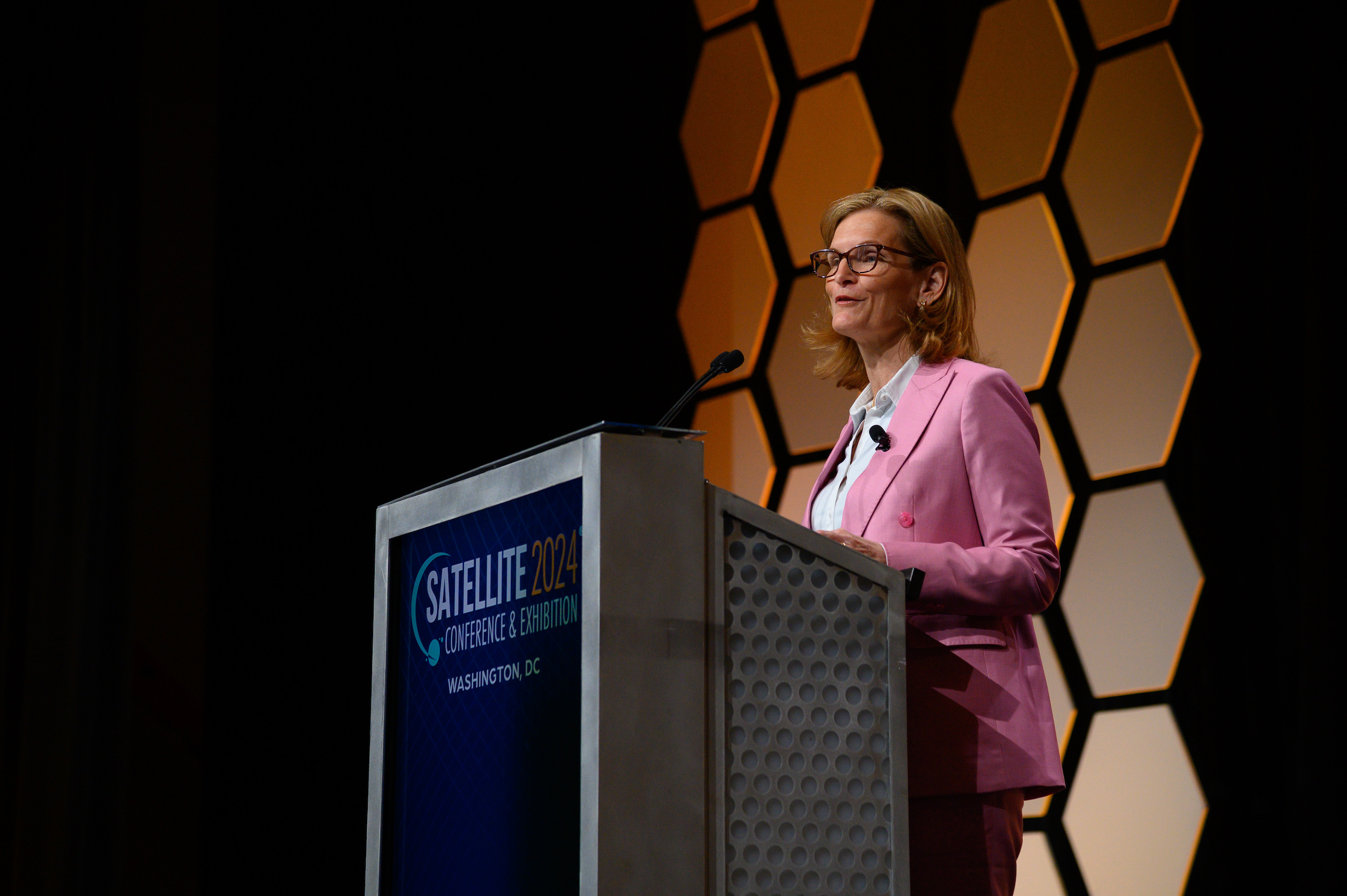Latest News
ITU Chief Bogdan-Martin Tasks the Satellite Industry With Expanding Internet Access

ITU Secretary General Doreen Bogdan-Martin speaking at SATELLITE 2024. Photo: Access Intelligence
International Telecommunication Union General Secretary Doreen Bogdan-Martin sought to position her agency as the conscience of the space industry in her keynote address to SATELLITE 2024, urging support for the United Nations’ Sustainable Development agenda and efforts to connect the third of humanity, overwhelmingly poor and rural, who are still offline.
The satellite industry, through its innovation and creativity, had made extraordinary technological progress, creating a market worth hundreds of billions of dollars a year, she said.
“But as this industry advances at the speed of light, digital inclusion is inching forward at a snail’s pace. Even with thousands of satellites orbiting overhead, 2.6 billion people are still unconnected,” Bogdan-Martin said.
This digital divide is “one of the biggest challenges of our time,” she said, “It’s right up there with climate change and environmental sustainability.”
To meet that challenge, the International Telecommunication Union (ITU) had launched its Partner2Connect Digital Coalition, an effort to corral private sector resources to “connect the hardest to connect” — those in poor and isolated rural communities, especially in developing landlocked or small island nations without a connection to the global fiber optic network.
She said the agency was halfway to its goal of raising $100 billion from private sector partners by 2026, including $9 billion committed at the recent Mobile World Congress in Barcelona, Spain.
“Of course we can’t reach that goal without you,” she told the audience of executives. “Sometimes, as you know, satellite broadband is the only option to get to those hardest to connect, in the rural and the remote communities.”
And the industry had to step up to a role larger than just healing the digital connectivity divide, she said. Satellites are vital to the UN’s broader efforts to ameliorate poverty, “At least 40 percent of the UN Sustainable Development Goals actually rely on Earth observation, on remote sensing, and on global navigation satellite systems,” she said.
Other UN initiatives also rely on the space and satellite industry, she said, like the effort to create a global warning system for extreme weather events, becoming more common and more severe as a result of human-caused climate change.
The UN’s Early Warning For All initiative aims to create a global system which can deliver geo-located warnings about extreme weather events to communities at risk by 2027. The ITU is responsible for the communication and message dissemination part of that initiative, and is working to “scale warnings through a multiple range of communication channels. And of course, that includes satellite direct broadcast,” she said.
The ITU is the world’s oldest international organization, formed in 1865 to facilitate the transmission of telegraph messages across international borders. Now, Bogdan-Martin said, the agency is the global steward of the common resources represented by radio spectrum and orbit allocation.
As an example, she cited a 1971 ITU decision that the dark side of the Moon should be kept “as free as possible from transmissions,” so as to avoid any interference with radio astronomy. “Five decades and 77 successful lunar missions later, the ITU-maintained radio regulations continue to safeguard that lunar zone for radio astronomy, for critical space research, and for Humanity’s return to the moon,” she said.
The regulations and standards which the agency promulgates are essential to the business of space, she said, because they “ultimately secure your investments by seeking to prevent and eliminate harmful interference between radio systems.”
But the long term sustainability of those orbital and spectrum resources is the most important challenge facing the industry, she said, and would require “careful coordination and management for this industry and the entire global economy to be able to function.”
Bogdan-Martin noted that the quadrennial World Radiocommunication Conference, which is the rule-making body for the regulations the ITU administers, is devoting more and more of its agenda to space issues. The recently concluded WRC-23 had made important decisions, allocating more spectrum to satellite transmissions, and establishing “a more stable and transparent regulatory framework for space services.”
More than 80 percent of the agenda items agreed for the next WRC in 2027, related to space issues, she said. “International cooperation in space communications is more important than ever before, whether it’s for multinational or commercial missions,” she said.
Get the latest Via Satellite news!
Subscribe Now